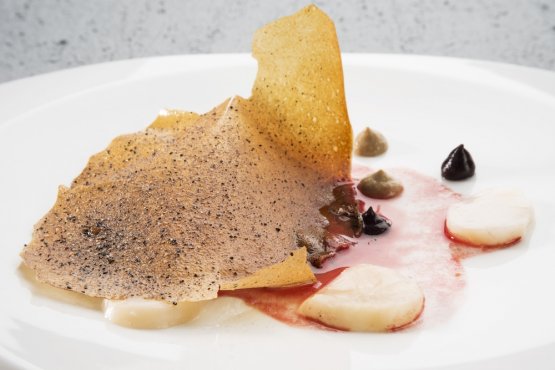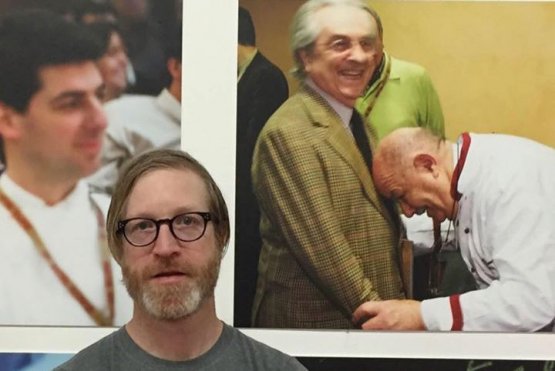One needed the gift of ubiquity, it’s often been said, to be able to appreciate the content of each of the 86 speakers in the eleventh edition of Identità Milano. Despite missing many, we were lucky enough to be able to listen to one closely. Canadian Daniel Burns was part of the Identità Estreme format for a peculiarity which our readers probably know by heart: his Luksus in Brooklyn is the first restaurant in the world to receive one Michelin star without having a single wine in the list. Just beers.
Yet Burns is not “extreme” just because of this or the incredible curriculum that allowed him to break the bank in New York – he was the pastry chef beside Heston Blumenthal, Renè Redzepi and the head of the Momofuku test kitchen, of a certain David Chang, that is to say 3 of the greatest chefs in the world in the last 15 years. He’s a producer of brilliant ideas and special projects. He confirmed this in the few words we shared when the congress was over.
During your speech, you said that in the future fine dining restaurants will be simpler and less expensive than they are today. An interesting concept. Can you please tell us more about it?
I just meant that what I see as the trend is for restaurants that are opening up these days by chefs who are trying to do "fine dining" restaurants; there is less focus (if any) on doing things grand in the old school sense, that is to say white table cloths, fancy linens, fancy glasses, etc. Instead, there is a focus on the ingredients and to make the room meaningful and comfortable in terms of whatever the chef/restaurateur thinks that means. Money is spent on products and to make the space real and comfortable but not stuffy or grand.

Scallops, maitake mushrooms and silverberry, a dish presented at Identità Milano
A soup is a very basic thing to make; but a good soup must be balanced and well seasoned with the vegetables and meat cooked properly. Texturally correct and generally good. It is a very basic test of being able to cook or not. We always have a 'broth' on the menu; basically a refined clear soup that has many layers of flavor.
Do you follow any basic rules when pairing food with beer? Who has the last word, you or your beer sommelier?
How it happens is once I have the dish nearly complete, and the flavors decided upon - I send an email to the beer pros and they have an internal discussion about what would work. Then we order in 4-6 beers to taste with the dish. There is almost always a clear winner. And yes, I have final veto power.
Tell me about your passion for gelato. Where was this passion born? How will you give shape to it in your dreams?
I learned about ices at The fat duckwhere we would spin 14 ice creams for lunch service and 10 for dinner service. It had its own section - ice cream production. It opened my mind to what amazing ice cream could be. I have loved making it ever since - and at NomaI developed my own ideas on what is good texturally and in terms of mouthfeel. I will one day open a gelato shop that incorporates pastry techniques into the experience.

Behind him, Identita's shoot: Massimiliano Alajmo, Gualtiero Marchesi and Pierre Troisgros
I think savory ices can work... but should be used in a limited amount. And they must be very well balanced and work together with the dish well as the ice melts and the chef must be certain that a cold element will make sense in the beginning or middle of the progression of dishes.
Do you think Luksus would be successful either in a European city like London, Paris or Milan?
I think it would, yes... Copenhagen, Paris, London... All could work, I think.
I’m asking this because you said you don't want to spend all your life in the US because the European lifestyle is more relaxed. How long can you resist in Brooklyn?
I would love to return to Europe (UK or Denmark) and would jump at the right opportunity to do something interesting.